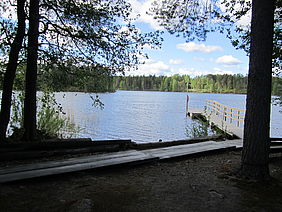The event was organised as a back-to-back event with a Lead Partner seminar for approved NPA projects on 1st October.
Among the main speakers were region mayor Mr Jussi Huttunen, Ms Joanna Kiryllo from the European Commission, and Mr Aleksi Härkönen, Finland's Ambassador for Arctic Affairs, Ministry for Foreign Affairs.
In the morning session, Ms Nathalie Wergles presented her report with baseline and target values for the programme result indicators. The report was the outcome of an exercise that took place during the spring and summer, involving panels of thematic experts from different NPA regions. She concluded that the achievement of the result indicator targets depends on the success of the individual NPA projects.The presentation was followed by a panel discussion with 4 of the experts, facilitated by Mr Ole Damsgaard.
The morning continued with the topic of coordination with other EU programmes and instruments relevant for the NPA, in particular in the Arctic. Ms Joanna Kiryllo, DG REGIO, set the scene by underlining the importance of coordination and synergies with other instruments, and shifting to a mindset of theme-based development. Dr Irene McMaster, EPRC, and Mr Jim Millard, Scottish Government, presented the conclusions from the preparatory project looking into a mechanism for collaborating on regional development in the Arctic. The need is well acknowledged, but commitment is needed to take the initiative further.
The morning session ended with a brief overview of the programme status after 2 calls; 19 projects have been approved representing an allocation of approximately 33%. However, it was clear that the distribution of the projects over the priority axes was quite unbalanced; the majority of applications addressed priority axis 1 Innovation and 2 Entrepreneurship.
In the afternoon, two parallel workshops took place. The workshop for NPA projects consisted of a number of exercises such as mind mapping to find gaps, overlaps, and potential synergies. The projects concluded that there was potential for the projects to cooperate closer with each other. The outcomes will feed into a consultation with the Regional Advisory Groups later this autumn. The workshop on coordination continued the discussion on the opportunities for cooperating closer with other programmes and instruments. Among other speakers was Ms Birgit Autere from the Finnish Ministry for Foreign Affairs on the recently published report of the Barents Euro-Arctic Council (BEAC). The main conclusion was that there is a willingness, and for this reason, it is better to speak of collaboration rather than coordination.
The afternoon session continued with the launch of the Third Call for project proposals, which is open until 30th November.
The conference ended with a presentation by Mr Aleksi Härkönen, Finland's Ambassador for Arctic Affairs, who spoke about the priorities for Finland's presidency of the Arctic Council in 2017.
Participants are encouraged to give their feedback through the online evaluation form.
Presentations and pictures can be found on the event page.

